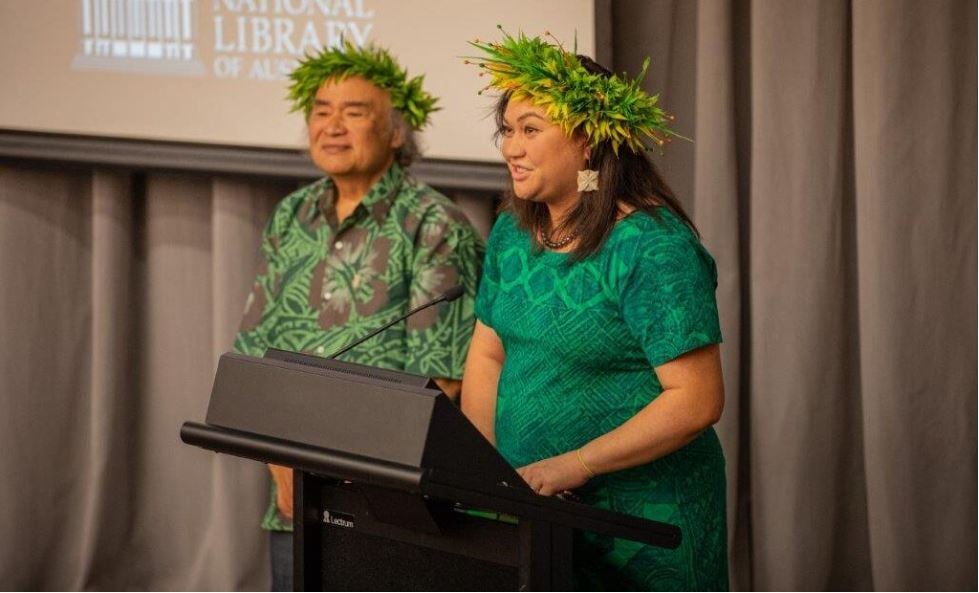
An online platform that allows Pacific cultural heritage to be visible and accessible to people in the Pacific and around the world is a finalist at the upcoming Digital Preservation Awards.
The platform known as ‘Digital Pasifik’ is a finalist in the National Archives (UK) Award for Safeguarding the Digital Legacy, category with three others from around the world.
The awards is run by the Digital Preservation Coalition based in the UK but this year’s event will be held in Ghent, Belgium, later this month.
Not only is it the first time since 2004 that an organisation from New Zealand has been a finalist for this global award, but it’s a first for a Pasifika project to be considered.

Not a bad feat for a project that began as a pilot in 2020 and was only set to be funded for two years. However, now in its fourth year, Digitalpasifik.org is still going strong.
The project is funded by the Department of Foreign Affairs and Trade in Australia and implemented by the National Library of New Zealand with support from the National Library of Australia.
Taputukura Raea, Programme Manager-Pacific Virtual Museum, for the National Library of New Zealand in Wellington says it was a huge shock and a surprise to be a finalist.
“I think this award is so that we can thank all the people that have supported us through those four years we’ve worked with our project…we’ve worked with lots of communities, our content partners,” she says.
The aim of Digital Pasifik is to empower Pacific nations to be able to see, discover and explore items of digitised cultural heritage that are housed in Museums, libraries and art galleries across the globe where many Pacific collections of images and objects are stored.

The idea is to gather all this material and make it available on one website. Taputukura says the project had a target to procure one thousand images for the website; they have now surpassed that with more than 500 thousand images.
“What we’re trying to do is hear the stories of the people that these collections belong to” she says.
“And some of my other highlights is travelling to the Pacific that many of our people are unaware that we have cousins in Micronesia who are also Pacific people, so when I tell them I’m travelling to the Northern Marianas they think, it’s like, in Asia, or if I’m telling them I’m going to Palau they are unaware that our island cousins exist.
“It’s been really good to understand and hear from them first hand about how their culture is important to them and how they’re still practising it so being face to face with the people and hearing these stories has been one of the highlights,”
Taputukura says the impact has been felt on a global scale.

“For example, we shared some pictures where one of our colleagues is over in Budapest and he found some photographs from the Cook Islands, pictures from Rakahanga and Manihiki from 1893 to 1896.”
She says after sharing the pictures on their Facebook page, it gained attention with more than 70 shares and hundreds of likes. Taputukura says it helped that there was a location and dates attached to the images.
“…I think for our small islands to actually see these collections that are so far away, it has had a huge impact because they can find connections by hopefully finding pictures of their ancestors.
“I think there’s just so many collections around the world that our people are unaware that they even exist,” she says.
Even for Taputukura who is of Cook Islands heritage, her Mother hails from Palmerston Island and her Father from Mauke, the website has also provided her with an opportunity to share some of her family history.
“Getting my grandad’s war records into the website, I was like, I’ve got to give my legacy for my family so that they can access it.”
Taputukura is proud of what they have been able to accomplish in the four years she has been working on the project.
“Our Pacific people have the stories but they don’t have the objects,” she says..
“Many of our European institutions have warehouses of our Pacific collections but they don’t have the knowledge or the context…so if we could be a bridge between our communities and our content partners so that our people can feel connected with the ancestors, that’s my purpose of our project.”

As she prepares for the trip abroad, Taputukura recognises how important being a finalist for the awards is for the people of the Pacific.
“I think for me it’s a huge honour to be in a position like this. I have the opportunity to highlight how great our Pacific people are… so I’ll be ‘repping’ my Cook Islands culture and my Pacific culture while I’m in Belgium.”
And Taputukura is not just passionate about sharing Pacific stories across the globe, she would also like to see Pasifika people consider a career working in spaces like the National Library and Museums.
“There just aren’t enough Pacific people in these spaces and many of the people that are looking after our collections are not from our culture so they don’t know the sensitivities or the cultural protocols involved,” she says.
“I encourage you, if you’re interested in your history, if you’re interested in your culture, try and get to your libraries, get to your museums and see if you could just volunteer to see if you like it because we need more of our people in these spaces.”
To learn more go to http://www.digitalpasifik.org/














